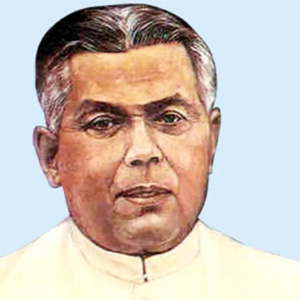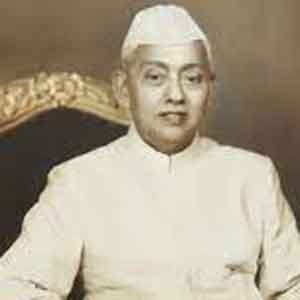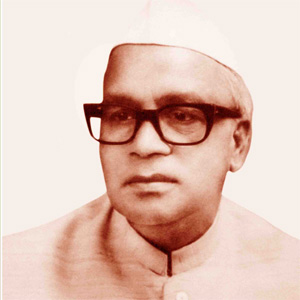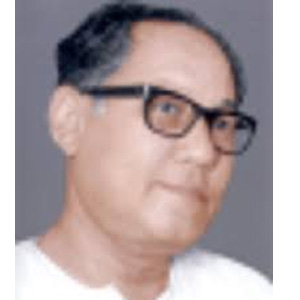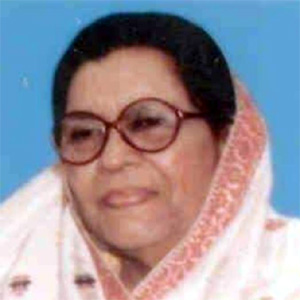Congress Chief Ministers of Assam
Gopinath Bordoloi
(11 February 1946 to 6 August 1950)
Gopinath Bordoloi played a major role in securing the future of Assam which would have otherwise been included in East Pakistan otherwise. His work formed the basis for ensuring communal harmony, democracy and stability which effectively kept Assam secure and progressive right up to the 1971 war over East Pakistan's independence. Due to his unselfish dedication towards Assam and its people, the then Governor of Assam Jayram Das Doulatram conferred him with the title "Lokapriya". He was instrumental in establishing Gauhati University, High Court of Assam, Assam Medical College, Assam Veterinary College, etc. He was conferred upon Bharat Ratna posthumously in 1999.
Bishnu Ram Medhi
9 August 1950 to 27 December 1957
As the Chief Minister, Medhi understood the gravity of the illegal influx from Bangladesh posing serious threat to the local population. He took stern action against illegal settlers. His dedication, simplicity, honesty and love for Assam and India was legendary. He is known as the Iron Man of Assam. As per his wish, his home at Hajo was converted into Shishu Kalyan Kendra (Children welfare centre) while the other house in Latasil, Guwahati, was made a children library under Bishnu Nirmala Trust.
Bimala Prasad Chaliha
(Term of office: From 28 December 1957 to 6 November 1970)
During his tenure as the Chief Minister, the Assam Official Language Act, 1960 was enacted, which made Assamese language the sole official language of the state. He strongly opposed the division of Assam State into smaller states like Nagaland, Mizoram and Meghalaya. He was member in various Committees of India's Central Government. He was instrumental in promoting the Plantations Labour Act, 1951 and corresponding Assam Plantations Labour Rules, 1956 to safeguard the interests of the Tea Plantation Workers of Assam.
Mahendra Mohan Choudhry
(Term of office: From 11 November 1970 to 30 January 1972)
A great persona and a true Gandhian, he fought for the independence of India during freedom movement. He wrote Books, viz. 'Mahatma Gandhi' and 'The Philosophy of Binova Bhabe'. He was associated with many socio-religious institutions like Sankardev-Kristi Vikash Samiti, Gita Samaj, Madhupur Satra etc.
Sarat Chandra Singha
(Term of office: From 31 January 1972 to 12 March 1978)
He was known for his value-based politics, Singha belonged to a rare breed of politicians who sacrificed his life for the welfare of the downtrodden people of Indian society.A true Gandhian, he never compromised with his principle what he preached and practised. His illustrious political life was a rare combination of honesty, simplicity and integrity. He was instrumental in setting up the Gauhati Medical College and Hospital and Bongaigaon Refinery and Petrochemicals Limited.He believed in decentralisation of power and introduced Panchayati Raj in the State for the welfare of the backward communities.
Anwara Taimur
(Term of office: From 6 December 1980 to 30 June 1981)
Syeda Anwara Taimur is the first Muslim woman Chief Minister of any state of India.
Kesab Chandra Gogoi: (Term of office: From 13 January 1982 to 19 March 1982). He was member of the Assam Legislative Assembly from Dibrugarh constituency. He was the Chief Minister of the state of Assam for two months in 1982.
Kesab Chandra Gogoi
(Term: 13/01/1982- 19/03/1982)
Keshab Chandra Gogoi was the 9th Chief Minister of Assam.
Hiteswar Saikia
(Term of office: From 27 February 1983 to 23 December 1985 and 30 June 1991 to 22 April 1996)
Saikia was a charismatic mass leader, an able administrator and an important player during the tumultuous period when the state was gripped by insurgency. Born into a peasant Ahom family in Upper Assam's Sibsagar district in 1934, Saikia started his career as a college lecturer in 1959. He quit academics and entered the Assembly for the first time in 1972. During his first tenure as the chief minister, the famous Anti Foreigners Movement took place. Saikia was a nationalist and an opponent of militancy in any situation. He is credited for improving the education scenario of the state by provincializing a number of educational institutions.
Dr. Bhumidhar Barman
(Term of office: From 22 April 1996 to 14 May 1996)
Dr. Barman was a physician and one of the senior most leader of APCC. He has been a member of the Assam Legislative Assembly being elected 7 times. He was first elected in 1967.
Tarun Gogoi
(Term of office: From 17 May 2001 to 24 May 2016).
Mr. Tarun Gogoi was a senior leader of AICC with a distinguished political career over four decades. He served six terms as a Member of Parliament (MP) in Lok Sabha. Mr. Gogoi became a political leader with national stature after he was elected Joint Secretary of the All India Congress Committee (AICC) in 1976 under Prime Minister Indira Gandhi. He later served as General Secretary of the AICC (1985–90) under Prime Minister Rajiv Gandhi. Gogoi served in the Union Cabinet of India under Prime Minister P. V. Narasimha Rao as Union Minister of State (1991–96). Gogoi was elected Chief Minister of Assam in 2001 after he led the Indian National Congress to victory in the state elections. He has since led the party to a record three consecutive electoral victories in the state as Chief Minister.
